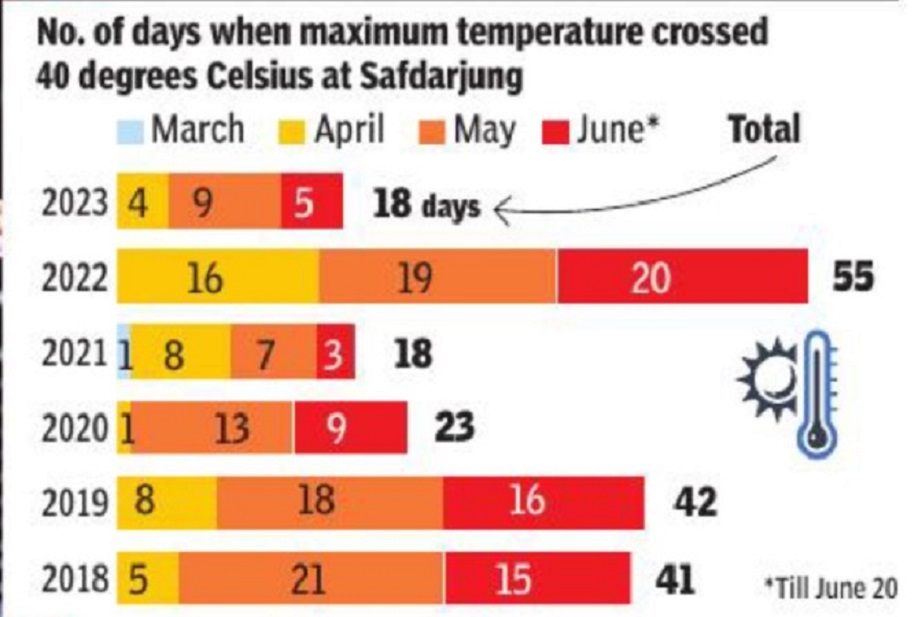Summers: India
This is a collection of articles, mainly from the Delhi- based press. |
This page is under construction. Data will continue to be added over the next several years.
Contents |
Average temperatures
Jan>Dec during a ‘typical’ year
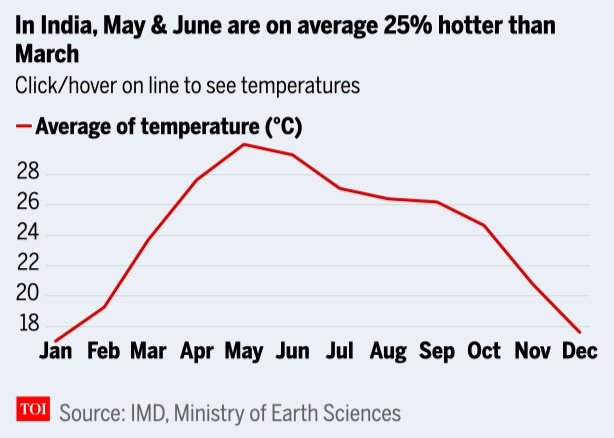
From: April 20, 2021: The Times of India
See graphic:
Average temperatures in India, Jan>Dec, during a ‘typical’ year
Extreme weather days
2024: March 1-June 9
/ Vishwa.Mohan/ The Times of India
and
/ Vishwa.Mohan/ The Times of India
The summer of 2024: India faced what was till then the longest ever spell of heatwave days These numbers were more than double of what these regions normally get in a year.
14 of 36 meteorological subdivisions in country recorded over 15 heatwave days. These subdivisions are spread across country, with east and north India the worst hit.
“This was expected and predicted in advance. In the year following an El Niño year (2023) we tend to g et more heatwaves. That is due to favourable atmospheric circulation for heatwaves,” said Madhavan Rajeevan, climate scientist and former secretary, ministry of earth sciences.
The Number of extreme weather days in 2024: March 1-June 9
27 Odisha
23 Rajasthan, western
21 West Bengal Gangetic
20 Chandigarh
20 Delhi (23 days, till 13 June)
20 Haryana
20 U.P. west
High altitude regions
Heatwave days reported in relatively cool high altitude regions
2024: March 1-June 9
12 Himachal
11Sikkim ,
6 J&K
2 Uttarakhand
Feb-April link: Do hot Februarys presage hot summers/ Aprils?
1971-2024: no discernible link
Amit Bhattacharya, February 28, 2025: The Times of India

From: Amit Bhattacharya, February 28, 2025: The Times of India
New Delhi : Winter has ended early in north India and Feb in Delhi is set to be among the three warmest in the last 15 years. So, does the early conclusion of winter indicate a long and scorching summer ahead? Contrary to the general view, data from past years shows that a warm Feb doesn’t necessarily lead to a searing summer in north India.
TOI analysed monthly average maximum temperatures in north India since 1971 and picked the 10 warmest months of Feb during this period. In five of these years, the corresponding months of April were indeed warmer or significantly warmer than normal but in the other five, April temperatures were either close to normal (four years) or below normal (one year).
These two months were chosen for the analysis because Feb is the last month of winter in north India, while April marks the beginning of full-blown summer conditions in the region. March is usually a month of transition.
“There is no direct one-toone r elationship between temperatures in Feb and April. Temperatures in these two months depend on multiple factors, including largescale signals such as presence of El Ni no (or La Nina) and synoptic features such as the frequency, intensity and duration of western disturbances,” said Mrutyunjay Mohapatra, director-general of India Meteorological Department.
Trends in recent years exemplify the absence of a link between temperatures in Feb and April. In 2023, north India experienced record heat in Feb but April was cooler than normal. Feb that year was the warmest since 1901, with the average maximum temperature 3.5 degrees above the mean during 1971-2024. However, April that year turned out to be the coolest in eight y ears, with average maximum temperatures nearly 1 degree below the mean during 1971-2024.
The reverse happened in 2022. April of that year in north India was the hottest on record, while temperatures in Feb were close to normal.
“In the y ears when a strong El Nino (or La Nina) prevails, there can be a link between temperatures in the two months. This year, however, we have a weak La Nina that’s not expected to influence temperatures,” Mohapatra said. Another factor that’s increasingly playing a role in making both months hotter in general is climate change. “The past couple of decades have been the warmest on record. So, because of climate change, the probability of any month being warmer than in the past is high,” said the chief of IMD, which is scheduled to release its forecast for the months of March, April and May soon.
May vis-à-vis April
May cooler than April: In 2025
Avg Max Temp Over 2°C Lower In May 1st-Half
________________________________________
The first half of May 2025 in Delhi was cooler than April 2025 — a first for the city since at least 2011.
Going by normal maximum temperatures, the first half of May is nearly 3 degrees hotter on average than the month of April. Climatologically, that’s a considerable difference and May is generally the hottest month of the year in the city.
However, in 2025, the average maximum temperature in May 1-15 was 36.7 degrees Celsius, nearly three notches below the normal of 39.4 degrees C. The average maximum during April was way higher at 39 degrees C, against the month’s normal of 36.5 degrees C.
Four days of thunderstorms were behind the cooler May 2025
This has been the second coolest May 1-15 period since 2011. The only year when May first half was even cooler was 2023, when the average maximum temperature at Safdarjung was 36 degrees C. However, unlike 2025, the relatively mild May in 2023 had followed a cool April, when the average maximum temperature was 35.3 degrees C.
Except for 2025, all years since 2011 (temperature records of Safdarjung are publicly available only since that year) have followed the climatological trend of May first half being warmer than April. The lowest difference in temperatures during the two periods was seen in 2022, when the average maximum was 40.4 degrees C in April and just 0.2 degrees highest at 40.6 degrees C in May 1-15. At the other end, 2015 saw a massive 5.3-degree difference when a pleasant April (average max 34.5 degrees C) gave way to a torrid May first half (average max 39.8 degrees C).
In May 2025 with Safdarjung recorded 91.4mm of rain till 16 May, the highest for the first half of the month in at least 15 years. By contrast, April logged just 0.7mm in a single day (April 12). IMD had forecast higher-thannormal rain in May. It had also predicted hotter than usual temperatures, which has so been not come true.
Heat waves
Definitions
Heat wave conditions are when the maximum temperature in an area is four or more degrees above the normal temperature. (The Times of India)
Heatwaves are spells of unusually high temperatures as compared to what is normally expected over a region. Thus, temperatures at which heatwaves are declared differ from place to place based on the historical temperatures of that region.
A heatwave is declared when the maximum temperature of a weather station is at least
40°C in the plains
30°C in the hills (“hilly regions”)
37°C in coastal areas
and it is 4.5 to 6.4°C above the normal temperature. If it’s 6.5° or more above normal, a severe heatwave is declared. Also, heatwave is automatically considered if the temperature touches 45°C and a severe heatwave declared if it reaches 47°C
(From: Vishwa.Mohan/ The Times of India and Vishwa.Mohan/ The Times of India)
Highest temperatures
Assam
1951-2024
Interestingly none of the temperatures in this section was recorded during what is traditionally called the summer in India
45.9° C at Gauhati University 20 Sep 2024
40.7 ° C within Guwahati city 20 Sep 2024
40° Celsius plus in 17 locations across 13 districts: 20 Sep 2024
The 20 Sep 2024 temperatures were “moderated” by IMD to below 40 ° Celsius.
40.6 ° C within Guwahati city April 24, 2014
The onset of summer
2012-19: The first 30°C day of the year in Delhi
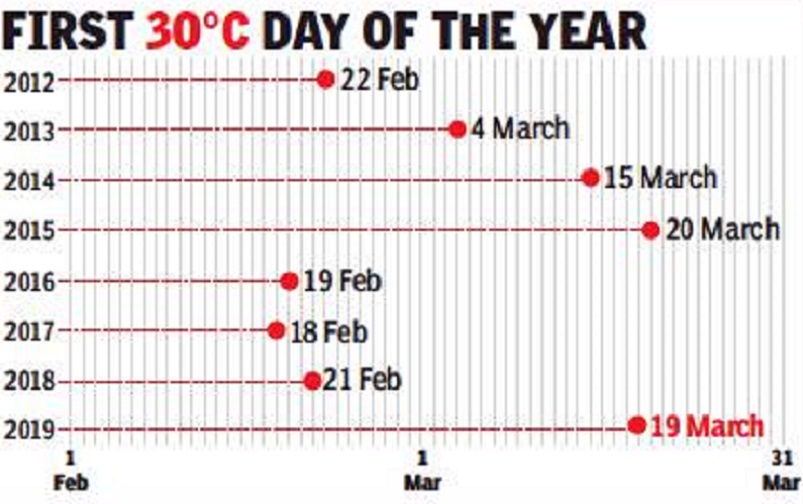
From Amit Bhattacharya Mercury hits 30°C, breaks 26-day run of below-normal temperatures 19 Mar 2019 The Times of India
See graphic, '2012-19: The first 30°C day of the year in Delhi'
Highest minimum temperature
21st century
34 degrees Celsius on 2018 June 13
33.3 degrees Celsius, on 2024 June 14; five degrees above normal, at Safdarjung, the city’s base station.
Other Delhi stations on 2024 June 14 recorded: Pitampura (35.7 degrees Celsius), Pusa (35), Raj Ghat (34), SPS Mayur Vihar (33.2), Jafarpur (32.4), Ayanagar (32.2) and Najafgarh (31.9).
‘Warm nights’: India Meteorological Department’s (IMD’s) definition: When the maximum temperature is above normal and the minimum is 4.5 degrees and more above normal temperature Priyangi.Agarwal, The Times of India
The first 30°C day of the year
Delhi: 2016-20
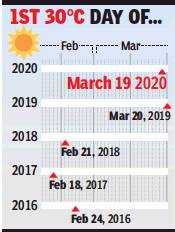
From: March 20, 2020: The Times of India
See graphic:
The first 30°C day of the year in Delhi, 2016-20
Warm summers
Delhi
40°C plus temperatures
2018-2023
40°C plus temperatures during the summer in Delhi, 2018-2023
See the graphic
REGION-WISE DETAILS
Churu
2019, 30 May- 5 June
Ashish Mehta, June 6, 2019: The Times of India
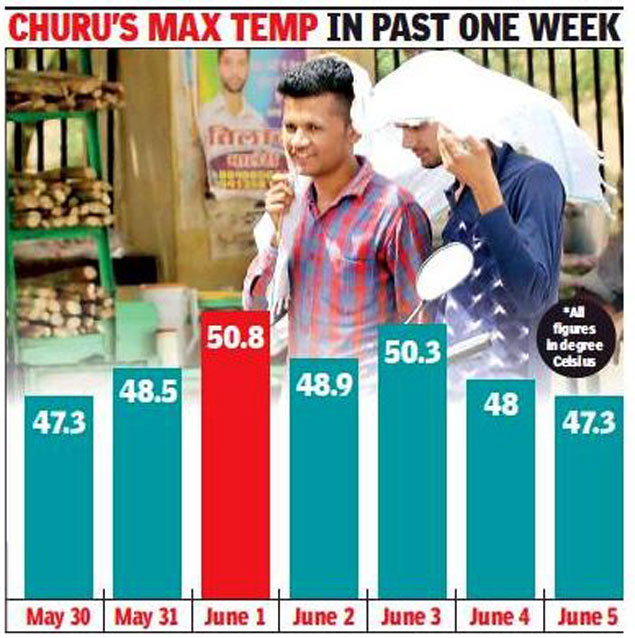
From: Ashish Mehta, June 6, 2019: The Times of India
How does one wake up to a minimum temperature of 34 degrees Celsius, or plan the day when mornings, afternoons and evenings melt into one solid time block, seamlessly dissolving in each other under a burning, brutal sky? Life in Rajasthan’s Churu now is like living on the edge of a tandoor. The glow of the fire seemingly inches away from scalding the skin.
At 50.8 degrees Celsius + (recorded last Saturday) and 50.3 (last Monday), it was the hottest place in the world. And it’s driving people crazy. For more than a week now, the temperature has hovered around that point. Men and women have altered their work cycle, eating habits and even lifestyle to cope with the blistering heat. Nothing seems enough.
“What has added to our agony is the power cut that starts from 4am, when it’s already close to 35 degrees C,” said Radhey Sharma, a retired government employee at the Housing Board Colony in Churu.
“Thereafter, we go out and bring at least 10 kg of ice, which is like a regular grocery item these days, to put it in the water tank and air-coolers.” There’s a rush of people at the district hospital, all complaining of vomiting, diarrhoea, heat stroke and skin ailments. Leaves of doctors have been cancelled and the entire district is on high alert.
“At least 70 patients are admitted in various wards for different heat-related problems,” said Dr Goga Ram, principal medical officer, Churu government hospital. He doesn’t expect the footfall to recede in the days to come.
Not surprisingly, says another doctor, Churu’s people have quickly changed the way they eat. Chaach (butter milk), raw onion, curd and chapati have become some kind of a universal breakfast, with many skipping lunch altogether.
“During such weather, it’s better to fill oneself up with fluids,” explained the medical man. “The more you consume oily stuff and carbohydrates, the greater the chances of compounding health problems.”
Out on the road, it’s almost eerie. By 10.30am, when most of India is bustling, the streets start emptying out in Churu. Public places are deserted, there are few passengers at railway stations and bus stands, and taxi-wallahs are nowhere to be seen.
Farmers, those mostly out in the unforgiving sun, hit their fields at 4am. It’s the same pattern that’s followed in neighbouring Binasar, Poti, Satara, Jasrasar and Jaasasar. “We don’t have an option,” said Balram Chaudhary in Jasrasar village, 24 km away from Churu. “By 7 am, it’s already simmering.”
It is toughest for nomadic people like the Gadiya-Lohars, some of whom work as ironsmiths by the roadside. “We wear wet cloths,” said Manhori as she hammered away near a furnace.
On measures taken by the district administration, a senior officer said they are sprinkling water all around, urging people to drink more water and regularly assessing the situation at hospitals. There isn’t much anyone can do when it’s so hot that birds start falling off trees.
The temperature touched 47.3 degrees Celsiu + s. Some saw it as bit of a respite. “It is a temporary relief,” said an officer at the Churu Met office. He wasn’t trying to be funny.
Panaji
Warm Summers
Highest single-day maximum temperature
1969 to 2023: there were 14 days when the maximum temperature in Panaji was 38°C or higher
39.8°C : 1989 April 7 The highest maximum temperature recorded in Panaji
See also February weather in India
Uttarakhand
Warmest March- April
2222: March 1 -April 20: Temperatures have been settling at least 5-7 degrees above normal, in both the plains and hills.
2004 March, was when This last happened, though for a lesser duration, when temperatures remained above normal by 4-6°C for 15 days.
See also
January weather in India <> February weather in India <> March weather in India <> April weather in India <> May weather in India <> June weather in India <> Summers: India: statistics and trends that cover more than one month.<> July weather in India <> August weather in India <> September weather in India <> Monsoons: India: statistics and trends that cover more than one month.<> October weather in India <> November weather in India <> December weather in India <> Winter rains: India: statistics and trends that cover more than one month. <> Winters: India: statistics and trends that cover more than one month.

